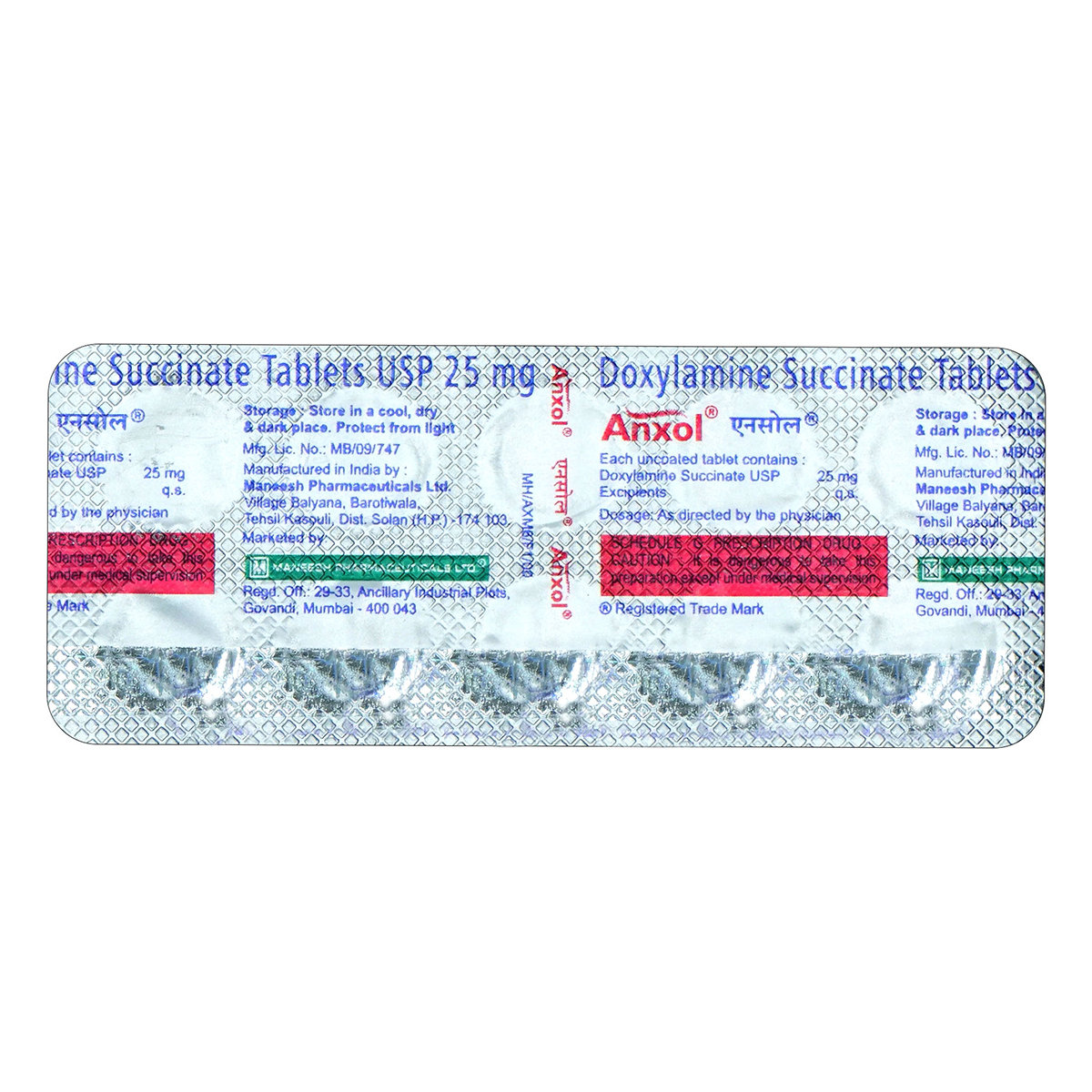Doxylamine
About Doxylamine
Doxylamine belongs to the class of medicines called sedating antihistamines indicated in the short-term treatment of insomnia. It is also used in combination with other medicines and decongestants to relieve symptoms of the common cold, hay fever, and allergy. Doxylamine may also be used to treat travel sickness.
Doxylamine contains Doxylamine, which works by blocking the action of histamine, a substance that causes allergy symptoms. Thereby, Doxylamine helps treats symptoms of the common cold. Doxylamine causes the central nervous system to slow down; this helps provide relief from insomnia.
In some cases, Doxylamine may cause side effects, such as dizziness, drowsiness, dry mouth, headache, and constipation. Most of these side effects do not require medical attention and will resolve gradually over time. However, you are advised to talk to your doctor if the side effects persist or worsen.
Consult your doctor if you are pregnant or breastfeeding. Doxylamine may cause blurred vision, drowsiness, and dizziness. Therefore, do not drive or operate machinery unless you know how this medicine affects you. Keep your doctor informed about your health condition and medications to rule out any side effects/interactions. Do not use this medicine for children without consulting a doctor.
Uses of Doxylamine
Medicinal Benefits
Doxylamine belongs to the class of medicines called sedating antihistamines indicated in the short-term treatment of insomnia. Doxylamine causes the central nervous system to slow down; this helps provide relief from insomnia. Doxylamine is also used in combination with other medicines and decongestants to relieve symptoms of common cold, hay fever, and allergy, such as red, itchy, watery eyes, itchy nose or throat, runny nose, sneezing, and nasal congestion. It works by blocking the action of histamine, a substance that causes allergy symptoms. Thereby, Doxylamine helps treats symptoms of the common cold and allergy. Doxylamine may also be used to treat travel sickness.
Directions for Use
- Doxylamine is to be taken on an empty stomach, either 1 hour before or 2 hours after a meal, or as advised by the doctor.
- Follow your doctor’s instructions on the dosage and timing of this medication to ensure safety.
- Swallow Doxylamine as a whole with a glass of water.
- Do not chew, crush or break it.
Storage
Side Effects of Doxylamine
- Drowsiness
- Dizziness
- Dry mouth, nose, or throat
- Blurred vision
Drug Warnings
Do not take Doxylamine if you are allergic to any of its components. Inform your doctor if you have/had asthma, chronic bronchitis, emphysema (lung disease that causes shortness of breath), breathing problems, glaucoma (increased pressure in the eye), ulcers, heart disease, thyroid problems, depression, seizures, high blood pressure, liver or kidney problems. Consult your doctor if you are pregnant or breastfeeding. Let your doctor know if you are taking any other medicines, including herbal or vitamin/mineral supplements.
Drug Interactions
Drug-Drug Interactions: Inform your doctor if you are taking sedatives (zolpidem), antihistamines (diphenhydramine, cetirizine), anti-depressants (duloxetine, escitalopram, fluoxetine, alprazolam, sertraline), anti-tussive (dextromethorphan), skeletal muscle relaxant (cyclobenzaprine), anti-convulsant (pregabalin), anti-psychotics (quetiapine)
Drug-Food Interactions: No interactions found/established.
Drug-Disease Interactions: Inform your doctor if you have chronic lung problems, glaucoma, prostate problems, high blood pressure, or seizures.
Drug-Drug Interactions Checker List:
Safety Advice

Alcohol
cautionAvoid consumption of alcohol as it may increase dizziness and drowsiness.

Pregnancy
cautionIf you are pregnant or planning for a pregnancy, please consult your doctor before taking Doxylamine.

Breast Feeding
cautionPlease consult your doctor before taking Doxylamine if you are breastfeeding.

Driving
cautionDoxylamine may cause blurred vision, dizziness and drowsiness. Do not drive or operate machinery unless you know how this medicine affects you.

Liver
consult your doctorPlease consult your doctor if you have a liver impairment or any concerns regarding this.

Kidney
consult your doctorPlease consult your doctor if you have kidney impairment or any concerns regarding this.

Children
unsafePlease consult your doctor. Your doctor may prescribe a suitable dose based on the age, body weight and condition of your child.
Habit Forming
Diet & Lifestyle Advise
Insomnia:
- Try sticking to a sleep schedule. Keep your bedtime and waketime consistent.
- Practise yoga or meditation as it helps in relieving stress.
- Avoid smoking and alcohol consumption.
- Avoid doing a strenuous activity before bedtime.
- Try relaxation therapy. Read a book or listen to soothing music.
- Do not consume caffeinated or carbonated products.
- Avoid taking large meals and beverages before bedtime.
- Exercise moderately as it can help in relieving stress.
Common cold:
- Wash your hands with soap and water regularly to prevent the spread of germs.
- Consume healthy fruits and vegetables.
- Drink plenty of fluids to avoid dehydration.
- Gargle with salt water for relief from sore throat.
Special Advise
- Doxylamine may cause unusual results with an allergy skin test. Inform your doctor that you are taking Doxylamine.
- Tell the doctor that you are taking Doxylamine if you are due to undergo any surgery, including dental surgery.
Patients Concern
Disease/Condition Glossary
Insomnia: Insomnia is a sleep disorder which causes trouble falling and/or staying asleep. The causes of insomnia are stress, noise, late-night eating/exercise, inactive lifestyle, drinking too much coffee, cola or tea, and certain medications. Symptoms of insomnia include difficulty falling and/or staying asleep and not feeling well-rested due to low quality of sleep.
Common cold: It is a viral infection of the upper respiratory tract (nose and throat). Symptoms of a common cold might include nasal congestion, runny nose, and sneezing.
FAQs
Doxylamine is used to treat Insomnia and Symptoms of the common cold.
Doxylamine relieves symptoms of allergy and cold by blocking the action of histamine, a substance that causes allergy symptoms. Doxylamine causes the central nervous system to slow down; this helps provide relief from insomnia.
Dry mouth could be a side-effect of Doxylamine. Limiting caffeine intake, avoiding smoking and mouthwashes containing alcohol, drinking water regularly, and chewing sugar-free gum/candy might help stimulate saliva and thereby prevent drying of the mouth.
Doxylamine is only prescribed for the short-term treatment of insomnia. Consult your doctor if you feel the need to take the medication for longer than 2 weeks. In case of a common cold, if your symptoms worsen or last longer than 7 days, consult your doctor.
Doxylamine contains Doxylamine, which belongs to the class of sedating antihistamines. It works by blocking histamine to treat short-term insomnia.
Doxylamine may cause drowsiness or sleepiness, a common side effect in some individuals. To ensure your safety, rest for a while after taking the medication and avoid driving or operating heavy machinery. In most cases, drowsiness subsides as your body adjusts to the medication. However, if the drowsiness worsens or persists, please consult your doctor for guidance.
Yes, there are specific contraindications associated with the use of Doxylamine. You should not take Doxylamine if you are allergic to any of its components. Inform your doctor if you have asthma, chronic bronchitis, emphysema, breathing problems, glaucoma, ulcers, heart disease, thyroid problems, depression, seizures, high blood pressure, liver or kidney problems. Also, consult your doctor if you are pregnant or breastfeeding. Let your doctor know if you are taking any other medicines, including herbal or vitamin/mineral supplements. Do not use this medicine for children without consulting a doctor.
No, do not take a higher dose than recommended. Taking more than the prescribed dose may lead to serious side effects. Always follow your doctor's instructions. If you have any concerns about the present dose, please discuss them with your doctor.
Store Doxylamine at room temperature. Keep it away from light and moisture, and do not freeze it. Make sure to keep it out of the reach of children.
The common side effects of the Doxylamine, which may occur in some individuals such as dizziness, drowsiness, dry mouth, headache, and constipation. Most of these side effects do not require medical attention and will resolve gradually over time. However, you are advised to talk to your doctor if the side effects persist or worsen.






